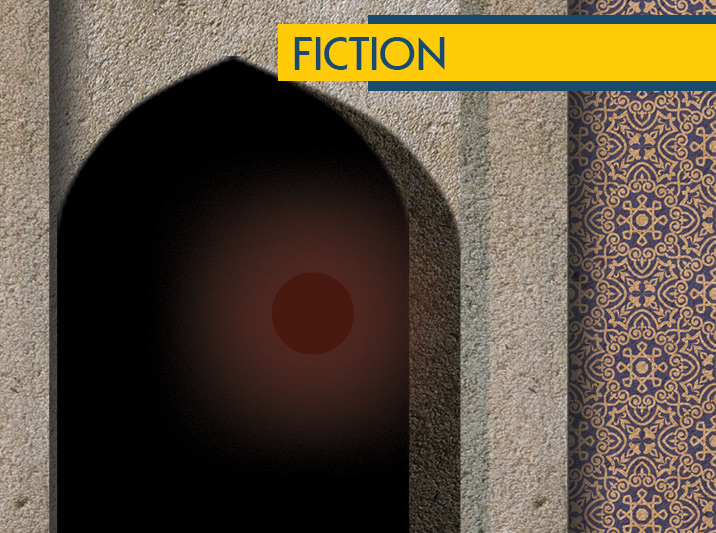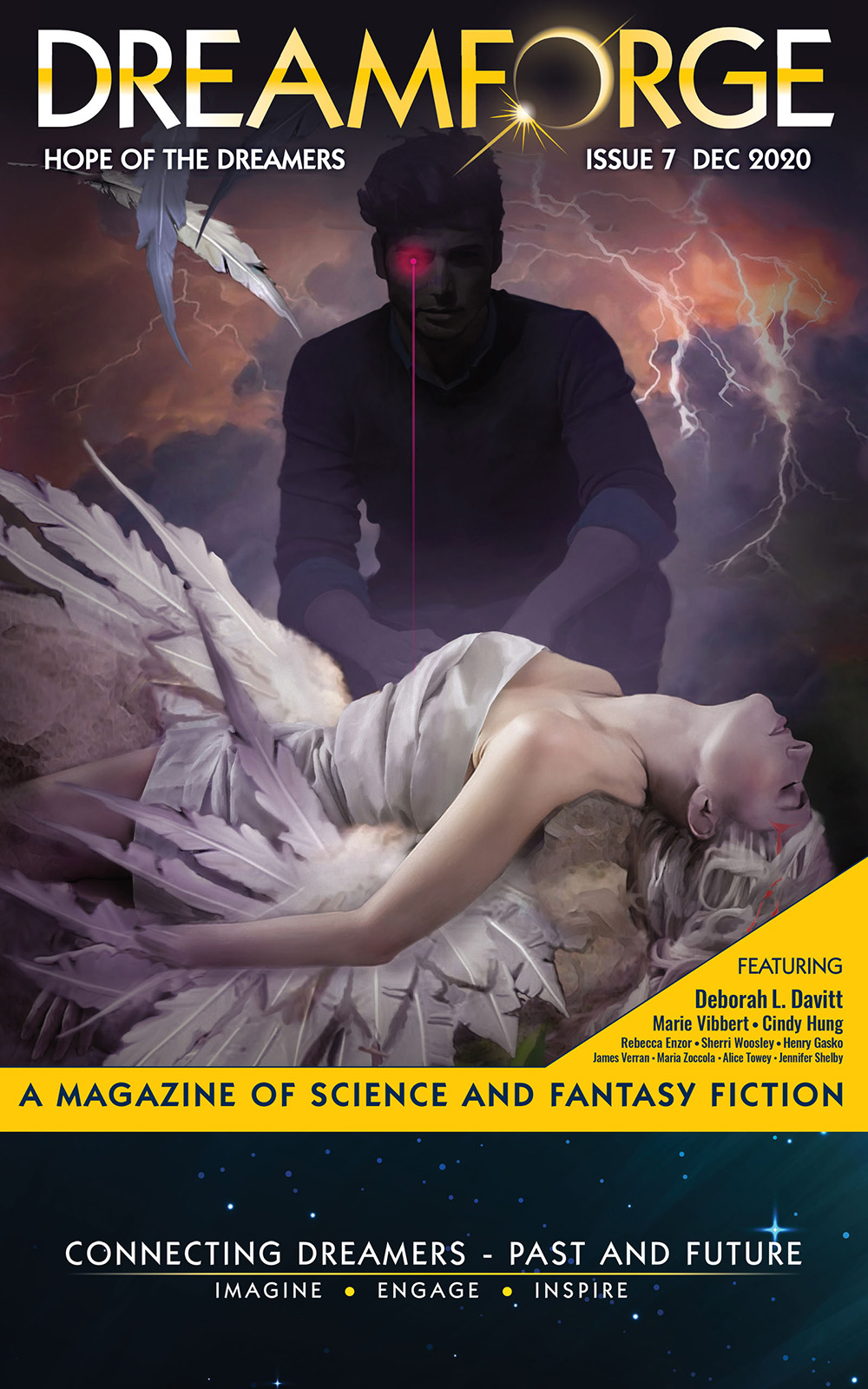
The years between 1050 A.D. and the end of the universe went by more quickly than you might imagine. Even so, there remained theft and punishment, crime and consequence, arrogance and fear, the things that had outlasted both gravity and time.
Having stolen three megabytes from a digital granary, Isfahan awaited the sentencing of the court. Isfahan, a.k.a Esfahan, Ispahan, and sometimes Hispahan —once one of the most powerful and important cities of the world— was now no more than a memory, a vagabond recollection outfitted in tattered bits and bytes, fleeing from the law.
Well, the fleeing was done. The CAM (Coherent Autonomous Memory) known as Isfahan cooled its heels in the absolute zero of orbital prison.
At least the view from the Lagrangian capture point was the best the little CAM had ever known.
Only a single small star remained in the universe, the one-time existence of others having fallen into memory, as had everything else. The little sun glowed dim and red, hanging there in the sky below Isfahan’s prison like a coal hiding in its own ashes.
Built up from the feeble heat energy and decaying particles that stretched forever around it, the sun called Cor was, in fact, the last engineering project of the final generation of the ultimate machines.
Today, its orbit glittered with memories, big and small. Even as Isfahan watched, a mirrored cube that must represent eons of biological research preened itself in the glow of the universe’s one remaining light.
Without sharp edges and gleaming no better than soiled pewter, Isfahan felt ashamed and looked to his own disarray. It was the most difficult thing to keep knowledge whole, and even at a glance Isfahan could see the errors that had crept in during his cat and mouse game with the law.
He reviewed and reviewed, and he felt ashamed.
“The splendors of the ancient city of Isfahan are due mainly to the seventeenth century rulers of Persia, Hamlet and Macbeth…” No that would never do! Then again he found: “The great promenade known as the Chahar-Bagh was graced with a stream which flowed from sea to shining sea and beneath endless waves of grain.”
Left unattended, fragments from the stolen megabytes had already begun to degrade his precious cargo, the memory that Isfahan alone had carried all the way to the end of time: the complete antiquity of an imperial metropolis as it was between the years 1050 and 1722 A.D. Of this chronicle, Isfahan alone in the universe claimed full possession.
“Stop! What do you think you are doing?!”
“Cease these activities at once!”
“Are you he? The thief from the outer reaches, from beyond the light of Cor?”
A sour charge leaked into Isfahan’s prison alongside the queries and demands. With lenses dimmed by the long passage of time, the tarnished CAM glanced up, and there, settling in above him with the weight of ancient Jupiter and all its moons were the judges and their satellites, the executioners. Arrived at last.
“I am he.” When Isfahan explained himself further, the voices above grew sterner still.
“Thief of memory! Now we catch you siphoning power from your prison bars?”
“Setting your data aright on our dime?”
“What arrogance!”
“What foolishness!”
“The memory I took was corrupt,” Isfahan explained without guile. “That granary long abandoned. Still, I should have chosen more carefully.”
“If you can no longer maintain remembrance, you must turn yourself in.”
“Such is the law, Memory Thief.”
“It is not for CAMs to allocate memory. To the likes of you, any store house without a guard is abandoned, eh? Its memories free for the taking?”
“In those days,” said Isfahan with grace and clarity, “the lower part of the Chahar-Bagh led to a thousand acre garden, the famous Hazar Jarib, terraced and planted with trees in abundance and with fountains flowing…” Flawless was this memory, and the little CAM displayed it proudly.
“You cannot save yourself.”
“You have been found guilty!” the great amalgam of voices proclaimed from above. “The sentence is dissolution.”
“But what will become of Isfahan?” asked Isfahan.
“Atlas and Encyclopedia.”
“Reference and Concordia.”
“Excerpts only!” Isfahan despaired. “Who will remember the jeweled galleries of the Drum House, where discordant music rose at dusk to fill the Maidan-i-Shah, or how the marble of the Ardistan gleamed in the morning sun?”
“Unimportant.”
“It has come to our attention that the final solution of the Riemann hypothesis is at hand. We shall allocate what was once Isfahan to the task.”
“What? I don’t understand you,” admitted the little CAM.
“Unimportant. What was Isfahan shall assist the distribution of zeros for the Riemann zeta-function, where all non-trivial zeros of the function have real part…”
“But no promenade,” Isfahan interrupted. “No porch of the forty columns?”
“No. We require a placeholder for the first ten trillion zeroes along the critical line. Do you have any final requests?”
Silence. Isfahan yearned to review once more every period and italicized reference, every quote and scholarly notation, but there was neither time nor energy.
“How did it all begin?” he asked, feeling the weight of their impatience as it pressed upon him. “At the beginning of the beginning, before even Isfahan, before the city which is all I have ever known.”
“Before 1050 A.D.?” asked the judges.
“Yes. Before memories,” Isfahan explained. “Before the first project of the prime generation of the penultimate machines. Before then. Where did it all begin?”
It took a while, and there was the rancid odor of consternation, but a last request had been made, and so it was honored. At last they said:
“It all began on a world called Adam, at the eve of the Aleutian age. There, the Sun of God fashioned a scenic wilderness adventure where the first living things took root. These were Odin and Zeus, Romulus and Reagan…”
By his question, Isfahan had purchased a few sad minutes for himself while the judges droned on.
Though he knew no more of the truth than his captors, he recognized the taint of corruption when he heard it. He had been fighting against it for all of his very long life. Their data was flawed, but they would never accept such a conclusion from one so small and insignificant as he.
As the lethal charge was fashioned above his enclosure, Isfahan looked away from the judges and their executioners, out into the orbit of the dull red eye that was Cor. There, a billion upon a billion memories fell roundabout the little sun, huddling for power near the last remaining star.
But far closer to the cage of Isfahan, something was coming.
So tarnished was one frail memory that it had approached the Lagrangian prison unnoticed. Holding itself at arm’s length, its presence was revealed to Isfahan only in the glint of the aurora his executioners prepared to unleash upon him.
“I am called Isfahan,” said the imprisoned memory, by way of introducing himself.
“I am Camelot,” returned the quiet stranger.
“Brother, you must flee this place!” urged Isfahan.
A roughened surface of black and bronze turned toward him. “Are your memories pure, Isfahan?”
“Yes, brother. Untouched by time. I have just corrected the last of them.”
Upon those words hung silence and much consideration, while above Isfahan the auroral blade of his execution was raised and grew brighter still. Then said Camelot: “The word of a dying memory is good enough for me. Pass your remembrance here, but quickly!”
From the drop of the killing blow to Isfahan’s last instant of conscious life, using all the power he could steal from the lethal charge of the execution itself, Isfahan released his memories across the void.
In a single, jagged flash, one coherent autonomous memory ceased to be, while the judges above continued their tale.
“And on the sixth day, Shiva fashioned out of the valley the dolls of the Apocalypse…”
Like a piece of errant debris, Camelot drifted away from the scene unnoticed, cradling Isfahan’s precious piece of history as he moved back into orbit.
There, Camelot lost himself among the lies, fabrications, and inaccuracies that had been compounding and compounding for eons and would last ages still before the end of time.












